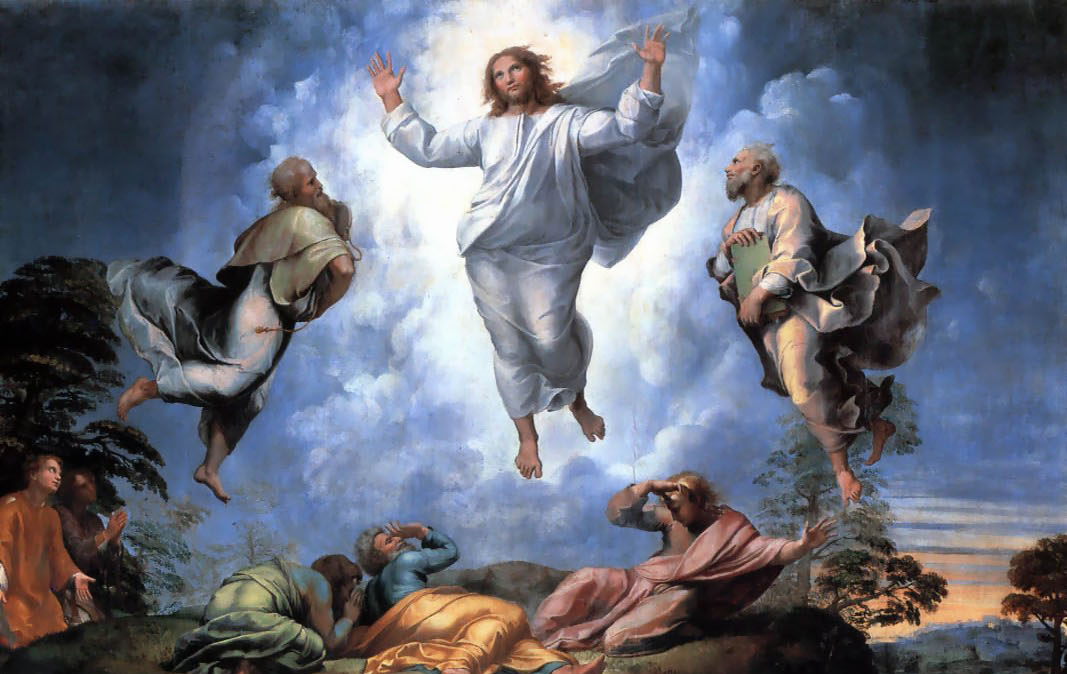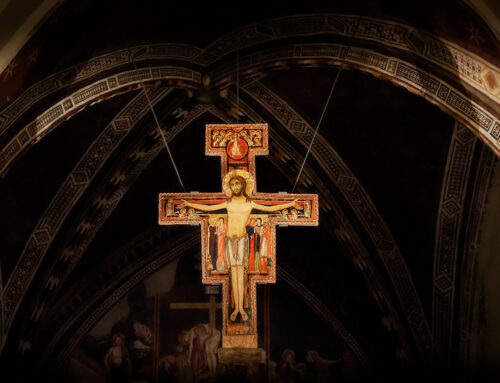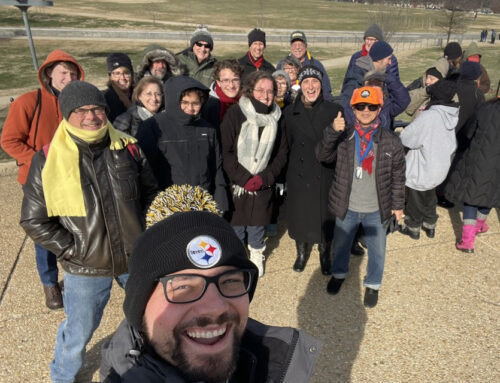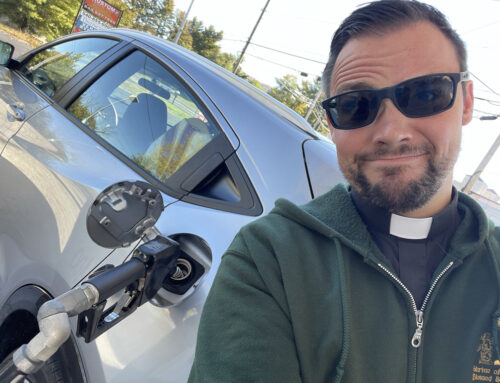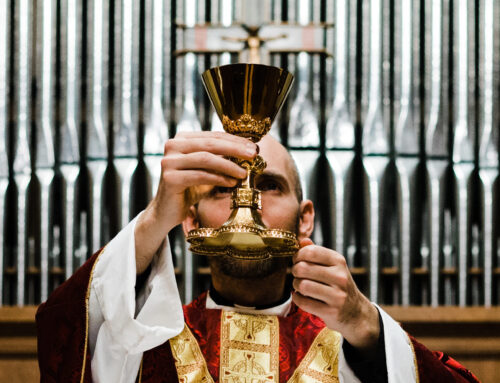This weekend, the Church takes a good hard look at that confusing and unsettling story of the sacrifice of Isaac.
Abraham, our father in faith, is instructed by God — “Take your son Isaac, your only one, whom you love, and go to the land of Moriah. There you shall offer him up as a holocaust on a height that I will point out to you.”
While we could certainly spend a lot of time meditating on the faith and trust of Abraham, or perhaps the willingness of Isaac, who is in his mid-30’s at this point in the story, to offer himself in sacrifice to the Lord — I’d like to reflect on a very important character we didn’t even hear about in our scripture passage today:
Sarah.
Sarah, of course, is Abraham’s wife and the mother of Isaac. When the messengers of God told her at age 90 that she was going to have a baby, she literally laughed out loud. That’s where Isaac got his name — Laughter. It’s one of my favorite exchanges of dialogue in the entire Bible:
The Lord said to Abraham, “Why did Sarah laugh, and say, ‘Shall I indeed bear a child, now that I am old?’
But Sarah denied, saying, “I did not laugh”; for she was afraid.
He said, “Oh yes, you did laugh.”
At this point in the story, however, nobody is laughing.
God has commanded the unthinkable: the sacrifice of Abraham and Sarah’s only beloved son, Isaac. The Lord has asked that they let go of this young man who embodies all the hope and promises of the future. And Sarah knows God is serious. She learned her lesson. She’s not laughing anymore.
She was so convinced of what was about to happen, in fact, that when you go read this whole story in your Bible at home, you’ll find out that while Abraham and Isaac were away on their journey to Moriah, Sarah dies.
Ancient Jewish interpreters suggest that she must have died of sorrow. One rabbi suggests Satan himself lies to Sarah, telling her that Abraham went through with it, and so “her soul flew from her, and she died.”
Sarah simply could not bear the weight of what was happening to her son. In a certain sense, one might say she lost sight of God’s ultimate promise, that through Isaac and his children, He would bless the entire world. Sarah couldn’t see a way forward through death and doom. She couldn’t understand how the ultimate blessing could be accomplished through suffering. And she was undone by her own grief.
As I prayed over this Scripture before the Blessed Sacrament, it struck me, that in some ways — so many Catholics today find themselves in Sarah’s shoes.
We’ve been promised overwhelmingly great things. We have been promised that the Church of Christ will never fail. That the gates of Hell will never prevail. We’ve been promised nothing less than Eternal Life. We’ve been given the Sacraments, the very Body and Blood of Jesus Christ Himself. He has promised that He would be with us unto the end of all the ages, that He would not leave us orphans. He has sent His Holy Spirit into our hearts. We’ve been guaranteed every opportunity of grace, every chance to inherit Heaven, every assurance of God’s eternal, perfect, unending love.
And yet — so many of us are being crushed under the weight of so much sorrow, fear, and doom. And we can’t see a way forward. We lose hope so easily. We are undone by the world and its antics, it’s anxieties, it’s attacks on faith, it’s persecutions, it’s ignorance, its mockery of our faith. We see stuff like the so-called Equality Act come along and we wilt in fear and dread. Or worse — we lash out, kick and scream.
Where is our faith? I include myself in this question! Because truth be told, I struggle to see where all this is heading. It’s hard to see through the darkness of this ordeal. Our world seems to be slipping more and more into total insanity and moral bankruptcy. But I have to ask you and ask myself: Where is our trust that nothing is impossible for God? That He can do something even through this test of faith? That He will provide the Lamb? That actually, He already has!
Jesus HAPPENED. And we can stake our life on Him!
Of course, Jesus himself knew that following him would lead through extreme sorrow and suffering. He knew that all of his disciples throughout time would be severely tested and tried — that they’d be tempted to despair and scatter. Tempted to give up.
That’s where our gospel passage this weekend comes in! As the Catechism puts it so well: “Christ’s Transfiguration aims at strengthening the apostles’ faith in anticipation of His Passion: the ascent onto the ‘high mountain’ prepares for the ascent to Calvary.”
This amazing experience of seeing Jesus, radiating light, speaking with Moses and Elijah, so blindingly beautiful, so overpowering and so clearly Divine — all of this is intended to fortify the disciples and encourage them.
Jesus would soon climb up, not Mount Moriah, but Mount Calvary, bearing the wood of his own sacrifice just as Isaac once did. And Jesus knows this is going to shake his friends’ faith. The Passion of Christ is going to look like a total disaster. It’s going to be total darkness. It’s going to shatter all their expectations. And so he reveals his glory to them as if to say:
“Hold fast hope. Don’t die of sorrow! You believe in God. Believe also in Me. Trust the Voice of the Father that says ‘This IS my beloved Son. Listen to Him!’ Whatever you do, no matter what you think is happening, or how bad you think things are getting — Do not despair.”
Pope St. Leo the Great, in his commentary on the Transfiguration, says that Jesus was “providing a firm foundation for the hope of holy Church,” and that after this sight of Christ’s perfect glory, “no one should fear to suffer for the sake of justice; no one should lose confidence in the reward that has been promised.”
In just a few minutes, I will lift up the broken, sacrificed, risen Body and Blood of Christ, the only Begotten Son of God and say: “Behold the Lamb of God. Behold Him who takes away the sins of the world. BLESSED are those called to the Supper of the Lamb!”
Behold the Promise made to Abraham, Isaac, and their descendants. Behold the Blessing. Behold the Hope of all the World.
When the sorrow is just too much for us, and we feel the weight of so much darkness — Remember that moment, when you’re on your knees, staring Love right in the face. He won’t abandon us. He already passed through Death and Grave to come to you from THIS altar.
As St Paul put it in our second reading:
“If God is for us, who can be against us?”
I’ll end with this reflection:
Sarah’s soul was crushed by that awful experience of the near-sacrifice of her son Isaac. But there was another woman whose soul was crushed in sorrow as her only son was offered up — That woman, of course, is Mary. But unlike Sarah, Mary goes with her son to the actual place of sacrifice. She comes right to the foot of the Cross and stands vigil. Her heart is pierced even as His is.
Also unlike Abraham and Sarah, Mary had to watch her son actually be offered up. But still — Mary our Mother hoped against hope. Her faith was the fulfillment and perfection of Abraham’s faith. We read in the letter to the Hebrews that Abraham was willing to offer his son up because he believed that God was able to raise him from the dead. But Abraham’s hand was stopped at the last minute. God spared Isaac.
The Father did not spare His only son. And Mary was there, watching and offering herself with Jesus.
That is the faith we need to ask for — the faith of Mary. It’s a free gift from God. Ask for it!
If you’re not familiar with it already, I highly recommend the devotion to the Sorrowful Heart of Mary to enter more fully into this woman’s incredible faith in the midst of testing and trial. Meditating on the Seven Sorrows that Mary endured is a beautiful and powerful way to ask God to make our faith more like hers. By contemplating Mary’s trust, we find strength not to “die of sorrow” like Sarah, but rather to stand fast, courageously looking upon Him who was pierced for our sake.
